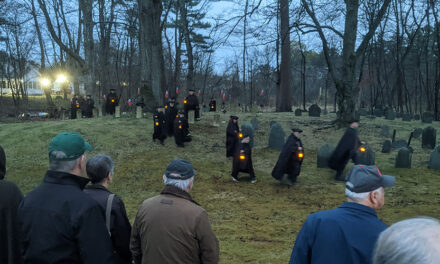Published in the November 4, 2015 edition
By MAUREEN DOHERTY
LYNNFIELD — A clerk magistrate has dismissed a conflict of interest violation allegation against Selectman Christopher Barrett after finding no probable cause that a violation had occurred.
The magistrate’s hearing was held in Peabody District Court Oct. 28 before Clerk Magistrate Kevin Finnegan to determine whether criminal proceedings were warranted in the complaint filed by Mark McDonough, 167 Bourque Rd.
McDonough alleged that Barrett was acting in violation of the state conflict of interest law because he is an abutter to the dilapidated Perley Burrill site at 906-913 Salem St. and he participated in selectmen’s meetings on Sept. 9 and Oct. 5 when updates on the status of the site clean-up and back taxes owed to the town by property owner Joseph Pedoto were discussed.
At the Oct. 5 board meeting, McDonough requested multiple times that Barrett leave the hearing room during the update because he has a financial interest in the outcome. Barrett declined to leave, stating that he had a right to be there and participate as a resident of the town.
As previously reported by the Villager, the board is down one member during discussions regarding Perley Burrill because Selectman Tom Terranova started recusing himself from the room about 18 months ago. Terranova formerly served as Pedoto’s accountant and has stated publicly that his ties to Pedoto have been severed. This leaves only Selectmen Chairman Phil Crawford without a potential conflict, which means the board cannot form a quorum.
“I’m just happy with the outcome of the clerk magistrate’s hearing,” Barrett told the Villager. “I want to keep this positive. I want to continue to move the town forward and not get caught up in this type of negativity. And I just want to make sure a resolution for Perley Burrill is not delayed and continues to move forward for the town.”
Barrett’s attorney, Mike Smerczynski, told the Villager Monday night that they presented their case to the magistrate that Barrett had not violated the state ethics law under Ch. 268A, Section 19A as alleged by McDonough.
“There was no probable cause to issue either of those two charges for a variety of reasons that can be taken individually or in any combination to defeat the issuance of the complaint,” Smerczynski said.
He explained that the first reason a criminal complaint was not warranted was the fact that Section 19A “doesn’t apply to Chris, even if he is an abutter, if his interest is shared – and this is a key thing – with a substantial segment of the population of Lynnfield.”
“Administratively, the state Ethics Commission has used a benchmark of 10 percent of a population to give a quantity to the term ‘substantial segment.’ Under that umbrella we were able to say during these meetings it was made apparent that Lynnfield was owed $160,000 in back taxes,” Smerczynski said, explaining that the recovery of those funds to the town treasury would be of substantial interest to the thousands of residential taxpayers in town.
Smerczynski said the board’s meeting minutes also revealed the fact that the “Perley Burrill site is a potential threat to the public drinking water, something that we argued would naturally be of interest to a substantial segment of Lynnfield; at least 10 percent would be interested.”
Three other issues at Perley Burrill that are part of the board’s record and which would affect a “substantial segment” of the town that were cited by Smerczynski at the hearing were the threat of asbestos contamination and the fire hazard presented by the dilapidated buildings as well as the fact that “the town could be responsible for an unknown environmental liability.”
Smerczynski also argued that at both selectmen’s meetings, “the Perley Burrill property was on the agenda just to receive information. No one made a motion, no votes were taken. It was just information collecting.”
Another critical point Smerczynski made to the clerk magistrate was that Barrett had consulted with the Ethics Commission “to consider the merits of participating” at future meetings as a “citizen” but not to take it as far as “leaving the room altogether” as suggested by McDonough.
“He absolutely reserves his right to participate in the hearings as a citizen by making it known that he is an abutter and he doesn’t think there is a conflict,” Smerczynski said of Barrett.
Smerczynski added that his client believes he has done nothing wrong by participating in these updates; however, he told the court that, “he’ll defer from official action until or unless town counsel opines on the Rule of Necessity.” This is a state Ethics Commission advisory developed by judges and applied in their court decisions to be used as a last resort to solve the dilemma of elected boards being unable to form a quorum on matters in which they are legally required to act when more than one elected official has a conflict of interest or a potential conflict of interest.
Once invoked on advice of town counsel, the Rule of Necessity would permit all members of the board to take action on that specific matter.
Because the probable cause request was denied and “no complaint was issued” against Barrett, Smerczynski said that the paperwork associated with these proceedings “are not public record” and that the law requires that, “all documents involved in the application for a complaint that’s been denied must be destroyed within one year.”




